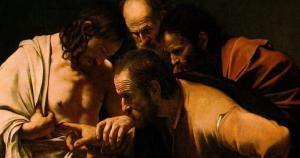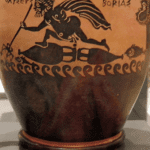 Yesterday was the Sunday of Saint Thomas: the disciple whose account ends any thought that First Century Palestine was stupidly credulous about miracles. After all, one of the most powerful group of Jewish people did not even believe in life after death!
Yesterday was the Sunday of Saint Thomas: the disciple whose account ends any thought that First Century Palestine was stupidly credulous about miracles. After all, one of the most powerful group of Jewish people did not even believe in life after death!
Thomas had scarring experiences we have not had nor will ever have that made reasonableness about a living Jesus hard. He had followed Jesus, Jesus had been crucified, now Thomas found reason hard, almost impossible given his experiences. He wanted to believe that Jesus was alive, but his post-traumatic stress was locking up his mind in gnawing doubts.
Thomas is not a model skeptic. He is so depressed, he can no longer hope. He may (also) be a misogynist, troubled by the testimony of women, but who can be sure? Thomas is (in this story) the last apostle in the old era; he lacks the Holy Spirit, the indwelling divine nature that enables a man to become like God (theosis).
In the context of John’s Gospel, the Divine Son is returning to the Father and sending the Holy Spirit. All humanity will be able to become children of God by having the Holy Spirit dwell within them. We, who have only historical records of Christ’s crucifixion, have the happy advantage of direct access to God. We are, as John points out, in a blessed state. In a beatitude Jesus states:
Thomas, because thou hast seen me, thou hast believed. Blessed (happy) are they that have not seen, and yet have believed.*
Thomas has had his request fulfilled, though as Gregory the Great argued, Thomas has gone beyond the evidence of merely touching the risen Lord when he (rightly) says: “My Lord and my God.” Thomas has seen a risen man, touched Him, and proclaimed His divinity, but this cannot be merely on Christ’s resurrection body. Instead, the encounter with Jesus Christ has taken Thomas further than just saying Jesus is not dead. He sees that Jesus is not dead, but Thomas had seen Lazarus raised. He did not proclaim Lazarus God. The coming of the Holy Spirit (given to the other apostles just a few verses earlier) enabled Thomas to see more than what mere vision would give. If you doubt this, note that Thomas famously touches Jesus, but Jesus says he has “seen.” He does not mention “touch.” Saint Thomas has gone beyond his traumatic doubts to a divine seeing. He had a revelation of God just like that all of us have: Thomas saw a man with scars risen from the dead and by the power of the Holy Ghost experienced God.
He saw and believed: excellent.
Happy, however, are those of us who do not see the risen God-man, but experience God through the Holy Spirit. The writer of John assumed the witness of the Apostles and the other evidences of history combined with a personal experience of the risen God-man through the Holy Spirit would be enough for reasonable belief. After all, if a man were determined to doubt, then Thomas had not “seen” enough to get to Jesus being God. He got there, because Thomas’ experience of Jesus was seeing that was more than seeing. He was blessed, but so are we!
We come to Jesus personally and touch Him in the Church His Body, the Word, and His sacraments.
The Gospel writer is not giving us an epistemology in these verses, though nothing he says is contrary to a sound, reasonable approach to living. Revelation and experience, deep personal experience, is a reason to believe, though not the only one. The direct experience of God in the Holy Spirit is (after Jesus) not just available in the Temple or to a few chosen ones, but to all God’s children.
Thomas saw the risen Lord: he did not need faith in the resurrection. He could not doubt it. Even if Thomas entertained the possibility of a mass delusion, Thomas had seen what he had seen, felt what he had felt. Yet this “seeing” was not enough: Thomas by the Holy Spirit (as Gregory noted) has gone further. He has seen God in the risen Lord and is blessed. We can be blessed too, because we need not see the risen body to experience the Risen Lord.
Oddly, Christian fundamentalists, never seeing a Bible verse they could not misunderstand, and Internet atheists** who never saw a Bible verse they did not understand like a Christian fundamentalist, both try to turn this verse into epistemological advice without understanding the context. One (occasionally) meets a Christian messed up enough to think this verse means they should just believe without evidence and (often) an Internet atheist**agrees.
They can then mic drop and meme forever: ignorance is bliss and they are happy all the time, secure in surety.
Instead, to the extent we have anything epistemological happening in this story, Thomas is healed of his trauma and is enabled to believe. The rest of us, everyone after the first few weeks of Pascha, are reminded we can be happy. We can have a good experience of God. Of course, if we doubt, then we should examine the evidence and it will be sufficient, but only if combined with a revelation of the risen Lord.
We have faith seeking understanding.
—————————-
*John 20: 29 Parenthetical “happy” is my explanation of the Greek term translated “blessed.” I have also used a period to show the beatitude plainly that Jesus is pronouncing on us.
**Internet atheists: no training in relevant fields, but opine as mirror Christian fundamentalists. Often former Christian fundamentalists. Atheism is a serious intellectual tradition. I have a great debt to many serious atheists. Internet atheists are not serious.












